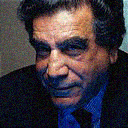 (Pictured: Khidhir Hamza, “Saddam’s Bombmaker.”)
(Pictured: Khidhir Hamza, “Saddam’s Bombmaker.”)
The Guardian reports: “Rafid Ahmed Alwan al-Janabi, codenamed Curveball by German and American intelligence officials who dealt with his claims, told the Guardian he fabricated tales of mobile bio-weapons trucks and clandestine factories in an attempt to bring down the Saddam Hussein regime, from which he had fled in 1995. [He said] “I had the chance to fabricate something to topple the regime. I and my sons are proud of that .”
Of course, even without Curveball (aka, the albatross around Colin Powell’s neck), the Bush administration would have found other pretexts to attack Iraq. In fact, before al-Janabi, others, wittingly or not, greased the skids for an attack on Iraq and deposing Saddam. For instance, Richard Butler, head of UNSCOM, the United Nations arms-inspection team from 1992 and 1997, wrote The Greatest Threat: Iraq, Weapons of Mass Destruction, and the Crisis of Global Security (Public Affairs, 2001).
Released just five months prior to 9/11, it chronicled the breadth and depth of the obstacles that Saddam Hussein placed in front of UNSCOM’s attempts to monitor Iraq’s presumed nuclear weapons program. Despite his difficulties, post 9/11, Butler, no hawk, continued to make the case for returning UN inspectors to Iraq.
Then there was the infamous Laurie Mylroie, president-day American Enterprise Institute fellow and one-time Neocon favorite, who reported — apparently with a straight face — that Saddam Hussein sponsored, among other things, the 1993 World Trade Center bombing, not to mention 9/11 itself!
Nor can we forget Khidhir Hamza, the author of an autobiography, Saddam’s Bombmaker: The Daring Escape of the Man Who Built Iraq’s Secret Weapon (Simon and Schuster, 2001). Conservatives used his account, released a month after 9/11, of helping Iraq develop a nuclear bomb to build the case for war.
Returning to the Guardian story, Al-Janabi said “They were asking me about pumps for filtration, how to make detergent after the reaction,” he said. “Any engineer who studied in this field can explain or answer any question they asked.”
That might explain how Hamza deceived a major publisher. His story has been discredited by UNSCOM inspectors who failed to find his name in records of Iraq’s nuclear program.
Let’s all take a moment then to honor Curveball and his forerunners for paving the way to years of lawlessness, poverty, migration, and — on an epic scale — death for the Iraqi people.